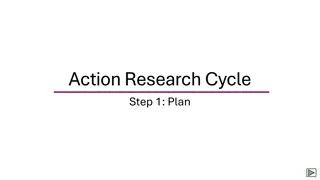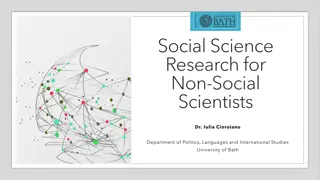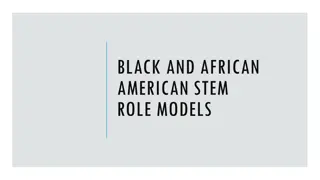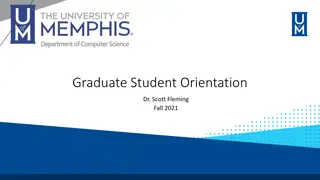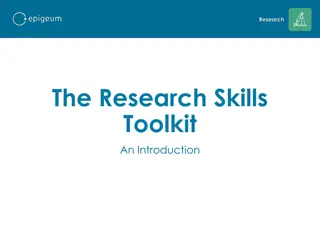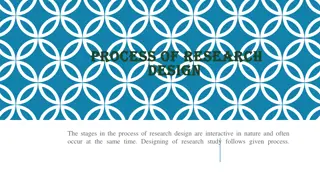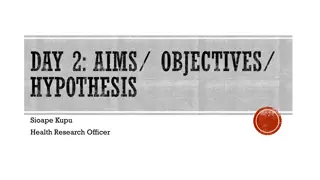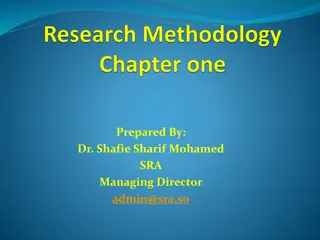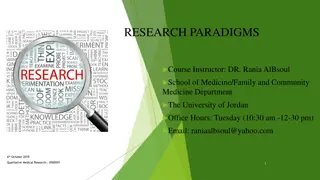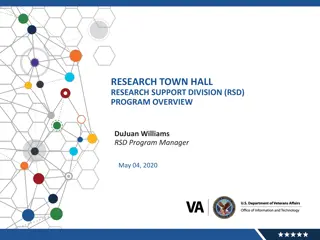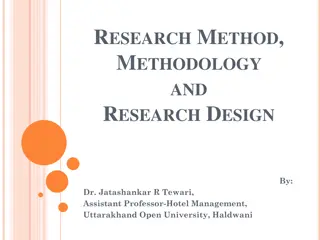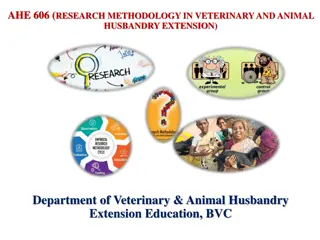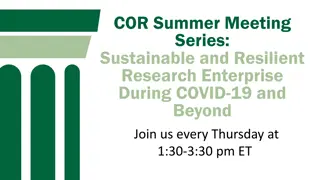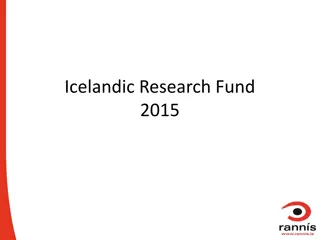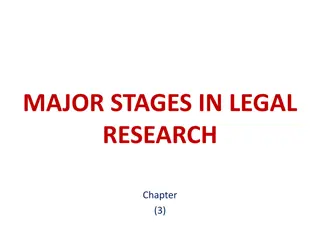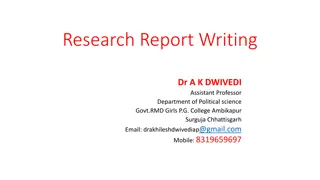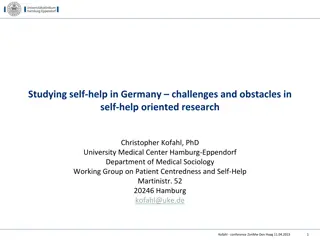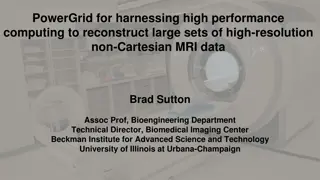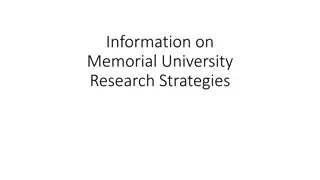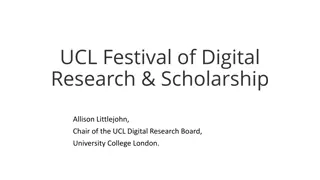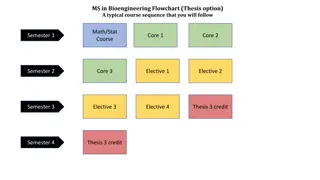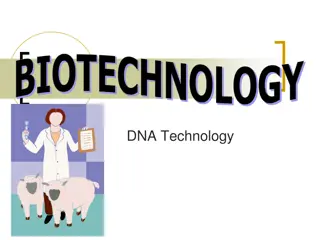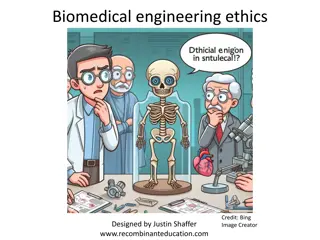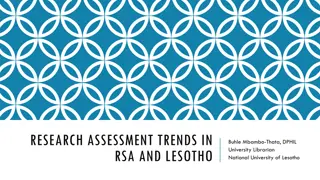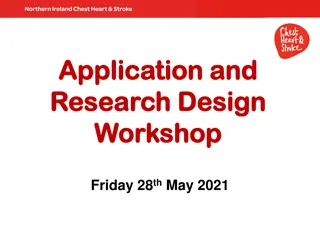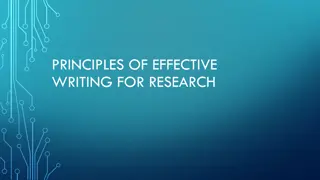Addressing Contemporary Challenges in Research Security Program Development
The Workshop to Inform Development of the Research on Research Security Program (RRSP) focuses on safeguarding the research enterprise amidst evolving global threats. Led by Dr. Rebecca Keiser and Dr. Shawna Cox, the program aims to balance security measures while maintaining an open and collaborati
3 views • 16 slides
Safeguarding Canada's Research: Policy on Sensitive Technology Research and Affiliations of Concern (STRAC)
Canada's new Policy on Sensitive Technology Research and Affiliations of Concern (STRAC) aims to protect the country's research ecosystem from foreign entities posing security risks. The policy restricts funding for projects involving sensitive technology research if affiliated with military or stat
1 views • 10 slides
Understanding the Process and Types of Research Design
The process of research design involves interactive stages that occur simultaneously, leading to the designing of a research study. This includes steps in research design, classification of research design types, such as exploratory, descriptive, and experimental/causal research design. Each type se
12 views • 8 slides
Introduction to Optimization in Process Engineering
Optimization in process engineering involves obtaining the best possible solution for a given process by minimizing or maximizing a specific performance criterion while considering various constraints. This process is crucial for achieving improved yields, reducing pollutants, energy consumption, an
10 views • 52 slides
Importance of Formulating Clear Research Problems
Addressing a research problem is crucial in research endeavors as it guides the process, helps in setting objectives, and determines the direction of the study. Formulating a well-defined research problem aids in understanding the research procedure, clarifying objectives, designing the research pro
14 views • 7 slides
Exploring Lunar Surface Radiation Risks and Mitigations Using Bioengineering
Lunar Explorer Instrument for space biology applications, LEIA Mission, addresses radiation health risks for crewed lunar exploration. The project aims to engineer yeast strains to study radiation sensitivity and identify genetic factors affecting cellular response. The instrument suite includes Bio
6 views • 8 slides
Action Research Cycle Step 1: Plan and Implementing Research Questions
Action research involves identifying a problem, forming research questions, and creating a research plan. It aims to understand situations, evaluate, problem-solve, and generate new ideas. Defining a research topic is crucial, focusing on the rationale and relevance. Selecting manageable topics dire
7 views • 17 slides
UCC Research Support and Strategies Overview
UCC's Research Support, Policy & Strategy function, led by David O'Connell, PhD, provides comprehensive support for research activities at the university. The office manages research funding, monitors performance, and facilitates engagement with external stakeholders. UCC's involvement in Horizon Eu
3 views • 17 slides
Understanding Social Science Research for Non-Social Scientists at University of Bath
This resource delves into social science research fundamentals, encompassing types of inquiry, empirical research categories, primary and secondary research distinctions, and the importance of selecting a suitable research topic. It offers guidance on initiating research based on empirical observati
1 views • 10 slides
Exploring Predictable Biodesign in Synthetic Biology
This content delves into the world of predictable biodesign and genetic composition in the context of synthetic biology. It highlights activities focusing on genetic device assembly, molecular techniques, and engineering principles to better understand and manipulate living systems. Through engaging
0 views • 36 slides
Inspiring Black and African American STEM Role Models
Beth Brown, Sarah Richardson, Gladys West, Mae Jemison, and Dorothy Vaughan are exemplary black and African American women who have made significant contributions in STEM fields. From astrophysics to bioengineering, programming to space exploration, these remarkable individuals have broken barriers
0 views • 16 slides
Graduate Student Orientation Fall 2021 - CS Department Overview
The Graduate Student Orientation for Fall 2021 at the CS Department led by Dr. Scott Fleming covers essential topics such as department mission, degree programs, faculty research areas, research impact indicators, and research opportunities within the department. Learn about the CS Department's high
0 views • 41 slides
Enhancing Research Skills with Epigeum's Research Skills Toolkit
Epigeum, a leading provider of online courseware, offers the Research Skills Toolkit, comprising five core programs designed to equip postgraduate researchers with key skills and knowledge. Developed from the Research Skills Master Programme, the Toolkit integrates interactive learning design, user-
1 views • 9 slides
Effective Proposal Writing for Health Research
Learn about the fundamentals of research proposals for health-related studies, including defining research, understanding the purposes of health research, and exploring motivation for undertaking research. Discover the difference between basic and applied research, examine types of research, and del
1 views • 70 slides
Overview of Research Problem Identification and Formulation
Understanding the importance of defining a research problem, this content delves into the selection and formulation of research problems, the definition of a research problem, reasons for defining it, methods for identifying research problems, sources of research problems, and considerations in sele
1 views • 11 slides
Understanding the Process and Types of Research Design
The process of research design involves interactive stages occurring simultaneously, leading to the creation of a structured study. There are three main types of research design: exploratory, descriptive, and experimental (or causal). Each type has its own objectives and methods. Exploratory researc
0 views • 7 slides
Understanding Research Aims, Objectives, and Hypothesis in Health Research
This content delves into the importance of defining research aims, objectives, and hypotheses in health research. It explains how research aims clarify the study's goals, objectives outline specific tasks to achieve those goals, and hypotheses help in making predictions. It also discusses the proces
0 views • 17 slides
Understanding the Essence of Research: A Comprehensive Overview
Research is a systematic pursuit of new knowledge, aiming to unveil hidden truths through data collection and analysis. This course outline delves into the fundamentals of research, covering topics such as types of research studies, importance of research, and distinctions between pure and applied r
2 views • 32 slides
Epic Tools for Clinical Research by Shara Power, RN, BSN, OCN
Explore Epic tools for clinical research developed by Shara Power, a skilled application developer specializing in EPIC Beacon Oncology at UIHC Healthcare Information Systems. Learn about managing research study records, investigational study medication orders, and the process for creating and using
0 views • 26 slides
Understanding Research Paradigms in Qualitative Medical Research
Delve into the world of research paradigms in qualitative medical research with a focus on the key differences between objective and subjective research, the meaning of research paradigms, components of research paradigms, types of research paradigms, and how paradigms guide the selection of researc
0 views • 42 slides
Overview of VA Research Support Division Program
The Research Support Division (RSD) program at the VA focuses on providing guidance and implementing enterprise information security standards for stakeholders involved in research programs. Their mission includes ensuring data security, risk management, and transparency while advancing VA Research.
2 views • 16 slides
Understanding Research Methods and Methodology in Hotel Management
Research in hotel management involves a structured process of inquiry to collect, analyze, and present information on various topics. The research process typically consists of steps like posing a question, collecting data, and presenting answers. Researchers follow a scientific method to identify p
0 views • 22 slides
Guidelines for Selecting Research Project Topics in Environmental Health
Research is crucial for addressing environmental health issues. Choosing a good research topic is the first step towards effective research. This paper discusses the meaning, characteristics, types of research, and the research process to help in selecting appropriate research topics. Understanding
0 views • 15 slides
Comprehensive Research Training Programme in Social Sciences
Delve into the Research Training Programme offered by the Graduate School of Social Sciences, led by Professor Mark Tranmer. Explore the importance of research methods training, course offerings under the Research Training Programme (RTP), the Certificate in Social Science Research Methods (CSSRM),
5 views • 11 slides
Understanding Research Methodology in Veterinary and Animal Husbandry Extension
Delve into the concept, nature, and scope of research in social sciences within the context of veterinary and animal husbandry extension. Explore types of research, variables, problem formulation, hypothesis testing, and the importance of research in generating new knowledge. Discover the process of
0 views • 15 slides
Sustainable & Resilient Research Enterprise Series
Join the COR Summer Meeting Series for insights on sustaining research amidst COVID-19 and beyond. Discover key topics like managing international research, eradicating sexual harassment, public impact research, and the future of university research. Share your stories of Public Impact Research on C
0 views • 19 slides
Icelandic Research Fund 2015: Enhancing Scientific Research and Education
The Icelandic Research Fund (IRF) aims to enhance scientific research and education in Iceland by awarding funding to research projects led by individuals, teams, universities, research institutes, and companies. Principal investigators must have completed graduate studies and experience in running
0 views • 22 slides
Understanding the Three Major Stages in Legal Research Process
Legal research involves a systematic three-stage process: research planning, research implementation, and presenting research findings. Each stage requires different skills and tasks, such as fact collection, legal analysis, problem identification, data analysis, and interpretation. The process incl
0 views • 36 slides
Importance of Research Report Writing in Academic Studies
A research report is a systematic, well-organized document that defines and analyzes a subject or problem. It is crucial for sharing findings, recommendations, and conclusions of a research project. Research report writing is essential in completing research tasks effectively and ensuring that the p
0 views • 23 slides
Challenges in Self-Help Research in Germany
Exploring the landscape of self-help research in Germany reveals various challenges and obstacles faced by researchers in studying self-help initiatives. The research delves into different aspects such as research scope, involvement of various groups, and the entities conducting research in this dom
0 views • 14 slides
PowerGrid: Reconstructing High-Resolution Non-Cartesian MRI Data for Bioengineering Research
PowerGrid is a cutting-edge system developed by Brad Sutton, Assoc. Prof. at the University of Illinois, for harnessing high-performance computing to reconstruct large sets of high-resolution non-Cartesian MRI data. This technology addresses the need for improved image reconstruction packages in MRI
0 views • 10 slides
Memorial University Research Strategies Overview
Memorial University's research strategies focus on attracting, retaining, and supporting researchers, fostering an environment of research excellence, engaging with community partners, and supporting fundamental and applied research. The university's strategic priorities include synergy in applicati
0 views • 11 slides
Building Comfort With MATLAB: Practical Strategies for Effective Learning
Discover the keys to building comfort with MATLAB for scientific computing, outlined by Wendy Thomas, an Associate Professor of Bioengineering at the University of Washington. From teaching experiences to software support, motivation, learning objectives, and scientific computing skills, learn pract
0 views • 9 slides
Exploring UCL's Digital Research Initiatives and Community Engagement
Uncover the significance of digital research at University College London (UCL) through the UCL Festival of Digital Research & Scholarship chaired by Allison Littlejohn. Learn how UCL is facilitating digital research, enabling innovation, and fostering a collaborative research environment. Discover
0 views • 13 slides
Typical Course Sequences in Bioengineering and Engineering Master's Programs
These flowcharts illustrate the typical course sequences for both thesis and non-thesis options in MS in Bioengineering, MD/E programs, and Master of Engineering degree. The sequences include core courses, electives, project courses, and thesis credits spread across semesters. Each program offers a
0 views • 5 slides
Understanding Biotechnology: From Ancient Techniques to Modern Genetic Engineering
Biotechnology is the study of utilizing tools from living organisms to develop new products and processes for the benefit of society. It encompasses ancient practices like fermentation to modern genetic engineering techniques, such as manipulating genetic information in organisms. The Human Genome P
0 views • 31 slides
Importance of Ethics in Biomedical Engineering Decision Making
Biomedical engineering ethics play a crucial role in decision-making processes within the field, influencing product design and treatment development. This article explores the significance of ethical considerations in biomedical engineering, evaluating ethical dilemmas, stakeholders to be considere
0 views • 14 slides
Research Assessment Trends in RSA and Lesotho: Issues, Challenges, and Forward Strategies
Research assessment in RSA and Lesotho involves evaluating research quality, measuring inputs, outputs, and impacts using both qualitative and quantitative methodologies. The prevailing practices include assessing research productivity for progression and utilizing various assessment mechanisms to e
0 views • 7 slides
Exploring Research Design and Funding Priorities in Northern Ireland
Dive into the world of research at the upcoming Application and Research Design Workshop scheduled for Friday, 28th May 2021. Discover the strategic priorities driving impactful research initiatives, learn about current research projects, funding processes, and collaborations. Explore the rich histo
0 views • 37 slides
Writing Research Papers Effectively: Guidelines and Steps
Effective writing for research involves developing a good research idea, writing a literature review, and understanding the key elements of writing research articles. This process includes coming up with a strong research question, gathering relevant information, creating an outline, writing the dra
0 views • 26 slides






